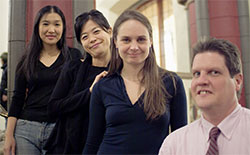Tongue Ties
You're an English teacher, and one of your foreign students says, "I read book yesterday." Do you a) politely say, "You mean, you read a book yesterday"? Or b) probe a little further to learn whether in the student's native language, the concept of definite and indefinite articles exist?
If you chose "b", you would have been right at home at the 28th annual Second Language Research Forum (SLRF), hosted by Teachers College in early October. The three-day event, which drew nearly 400 participants from 13 countries, was a clearinghouse for the latest research on the mental processes of "L2" (second-language) learners/users Much of the work in the field focuses on adults, because they are the learners who -- like the student in the example above -- have the most linguistic baggage to overcome.
"Adults come to second language learning with a full-fledged cognitive system, which may get in the way," says TC Associate Professor ZhaoHong Han, faculty advisor for the student-run conference, who was born in China, lived in Europe for 10 years before coming to the States, and fluently speaks Mandarin, English, Norwegian, and Italian. "Often when they make mistakes, it's not because they don't get it, but because there simply aren't parallel constructions in their native tongue."
Research presented at the conference sought to shape such insights into instructional paradigms. Vivian Cook of the University of Newcastle-upon-Tyne in the U.K., said that L2 users have a "multi-competence" and exhibit differences in their brain structures -- an argument for encouraging bilingualism at an early age. TC alumna Patsy Lightbown, Distinguished Professor Emeritus of Concordia University in Canada, used the theory of "transfer appropriate processing" to explain why people learn languages better through daily communication: "We are better able to retrieve information when the situation for retrieval is similar to the situation in which the information was learned in the first place."
Cook and Lightbown were joined by Michael Sharwood-Smith of Edinburgh's Heriot-Watt University as keynote speakers.
TC outbid other schools to host the conference, which was sponsored by TESOL and the Applied Linguistic Programs of the Department of Arts & Humanities, and drew a much larger crowd than in previous years at other schools. Many other TC centers pitched in.
"In this era of globalization, people who speak only one language have become a minority, and second language acquisition interest is growing, here and everywhere, to become a mainstream field of inquiry within linguistics," says Andrea Revesz, who co-chaired SLRF along with fellow students Eun Sung Park, Charles Combs, and Ji Hyun Kim. "TC's program has grown into a big place for SLA, especially since Professor Han came in 1999."
Published Wednesday, Dec. 21, 2005
